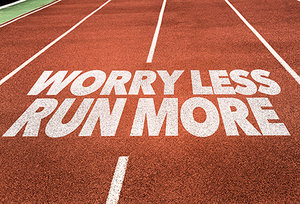More Exercise, Less Anxiety
By Editorial Staff
If you're feeling anxious, a little exercise may do the trick. Several mechanisms may be at play. From a physiological perspective, physical activity is known to stimulate production of "feel good" chemicals that reduce your perception of pain and increase positive feelings.
That's a win right of the bat when it comes to managing anxiety. Then there's the distraction element of exercise: when you're exercising, you don't have as much mental time or energy to focus on what's making you anxious; after all, your mental attention is turned toward executing the physical activity: running, lifting weights, etc.
New research suggests even people with chronic anxiety can benefit from exercise. Published in the Journal of Affective Disorders, the study involved nearly 300 patients with anxiety syndrome; half of the patients had suffered for 10 years or longer. Patients participated in a 12-week fitness program featuring either moderate or strenuous exercise (60-minute sessions, three times weekly); a third group served as controls and received advice only on activity according to public health recommendations.
Exercise sessions in both activity groups featured aerobic and strength training. Patients assigned to moderate-intensity exercise participated in activities designed to reach 60 percent of maximum heart rate; patients assigned to strenuous exercise performed activities designed to achieve 75 percent of maximum heart rate.
 After 12 weeks, "A significant reduction in anxiety from baseline to post-treatment was observed in both treatment groups compared to the control group," with most patients reducing their anxiety from a baseline (pre-exercise) level of moderate / high to a posttreatment (after 12 weeks of exercise) of low anxiety. Interestingly, no significant differences were noted between low-intensity and higher-intensity exercise, suggesting physical activity at any level is beneficial for managing anxiety, particularly chronic anxiety. Talk to your doctor for more information.
After 12 weeks, "A significant reduction in anxiety from baseline to post-treatment was observed in both treatment groups compared to the control group," with most patients reducing their anxiety from a baseline (pre-exercise) level of moderate / high to a posttreatment (after 12 weeks of exercise) of low anxiety. Interestingly, no significant differences were noted between low-intensity and higher-intensity exercise, suggesting physical activity at any level is beneficial for managing anxiety, particularly chronic anxiety. Talk to your doctor for more information.

